De Franse schrijver van Russische afkomst Andreï Makine werd geboren in Krasnojarsk op 10 september 1957. Zie ook mijn blog van 10 september 2010. en eveneens alle tags voor Andreï Makine op dit blog.
Uit: Dreams of My Russian Summers (Le Testament français, vertaald door Geoffrey Strachan)
„Throughout this parade of expressions and faces there recurred here and there that of a woman with fine, regular features and large gray eyes. Young at first, in the earliest of the albums, her smile was suffused with the secret charm of the “petite pomme.” Then, with age, in the more recent albums, closer to our time, this expression became muted and overlaid with a veil of melancholy and simplicity.
It was this woman, this Frenchwoman, lost in the snowy immensity of Russia, who had taught the others the words that bestowed beauty. My maternal grandmother… She was born in France at the beginning of the century in the family of Norbert and Albertine Lemonnier. The mystery of the “petite pomme” was probably the first of the legends that enchanted our childhood. And these were also among the first words we heard in that language that my mother used, jokingly, to call “your grandmaternal tongue.”
One day I came upon a photo I should not have seen…. I was spending my holidays with my grandmother in the town at the edge of the Russian steppe where she had been stranded after the war. A warm, slow summer dusk was drawing in and flooding the rooms with a mauve glow. This somewhat unearthly light fell upon the photos that I was examining before an open window, the oldest snapshots in our albums. The pictures spanned the historic watershed of the 1917 revolution; brought to life the era of the tsars; and, moreover, pierced the iron curtain, which was then almost impenetrable, transporting me at one moment to the precinct of a gothic cathedral and the next into the pathways of a garden where the precise geometry of the plants left me perplexed. I was plunging into our family prehistory.
Then suddenly this photo!
I saw it when, out of pure curiosity, I opened a large envelope that had been slipped between the last page and the cover. It was that inevitable batch of snapshots that have not been judged worthy to appear on the rough cardboard of the pages, landscapes that can no longer be identified, faces that evoke neither affection nor memories. One of those batches you always tell yourself you must sort through one day, to decide the fate of all these souls in torment…. “
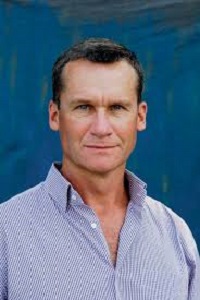
Andreï Makine (Krasnojarsk, 10 september 1957)
De Oostenrijkse dichter en schrijver Franz Werfel werd op 10 september 1890 in Praag geboren. Zie ook mijn blog van 10 september 2010 en eveneens alle tags voor Franz Werfel op dit blog.
Uit: Die Versuchung
„Das ist das Gesicht der Sieger!
Und du, Miß Olivia. Wie nenn’ ich dich?
Du Element, du Abend, du leiblos Üppige, du Regen im Saal!
Ich, ich sollte eifersüchtig sein!
Haha, hätt’ ich doch wenigstens die menschliche Kraft dazu.
Aber im Grunde verehre ich die anderen.
Das sind große Herren, in sich, voll Ruhe, Gemessenheit und Mittelpunkt. Sie haben das Leben wie sie’s wollen. Heute und morgen ist ihnen ein Ziel. Was daneben geht ein Malheur. Und du, Miß Olivia, was bist du ihnen? Etwas, was man erreichen und besitzen kann.
Begreift dich denn einer?
„Gemach,“ falle ich mir selbst ins Wort, „willst du denn etwas anderes als erreicht und besessen werden? Du rechnest nur zu gut. Alles, was du tust, ist Rechnung.“ Und ich fühle in diesem Moment wieder bis ins Mark, wie ich Narr des Zufalls dir fremd und widerlich sein muß.
Und doch, nur ich empfinde dich, nur ich empfinde deine Seele, nur ich deine metaphysische Erscheinung zur Welt.
Warum, wenn du die Hotel-Hall betrittst und in die Hände klatschend ausrufst „Kinder, das war schön, den ganzen Vormittag sind wir im Segelboot gesessen und haben uns treiben lassen“, warum werde ich dann so müde und traurig?
Warum muß ich an einen ganz bestimmten schwindsüchtigen, todbleichen Lehrer aus dem Erzgebirge denken, wie er aus seinem engbrüstigen Häuschen tritt und aus dem dünnen Vorbeet einen Salatkopf zieht? Warum habe ich diese Vision vom Aztekenkönig Montezuma? Wie dieser in überirdischer Märtyrerheiterkeit, goldgepanzert und konradinblond auf der Freitreppe seines brennenden Palastes steht? Sehe ich dich in Balltoilette, warum habe ich das rasche überwältigende Gefühl von Hochtouren, Durst, Ahnung von Quellensturz und jauchzende Glieder?“
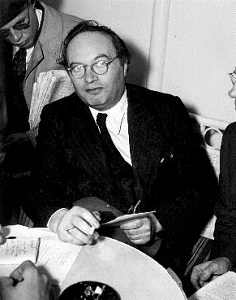
Franz Werfel (10 september 1890 – 26 augustus 1945)
De Poolse schrijver Paweł Huelle werd geboren op 10 september 1957 in Gdańsk. Zie ook mijn blog van 10 september 2010 en eveneens alle tags voor Pawel Huelle op dit blog.
Uit: Cold Sea Tales (Vertaald door Antonia Lloyd-Jones)
“If they’re going to crush them,” I said, turning to face him, and saw he had come on his bike, “they’ll only do it at night, when there’s no one here.”
“Maybe so,” said Fredek, who didn’t look worried, “but first they’ll have to force the gates with a tank. Then fetch them out from every corner of the shipyard. With a bit of passive resistance that’ll take hours. But what if the lads set off a few acetylene cylinders? Or get on board a ship and cut the hawsers?” At last we had reached the fence right next to the gates and Fredek had parked his bike, leaning it against the wire netting. “Besides, there’s one more thing too,” he said, pointing at the portrait of the Pope. “We’ve got him, and that’s better than the troops!”
“I’d rather rely on a few dozen striking factories. And the ones that are ready to join in.”
“Well, it’s actually happening,” said Fredek; he took out a packet of Sport cigarettes and we lit up. “It’s a real revolution, can’t you see?”
Like this we passed the quarter hours, smoking and chatting, that was all. More and more delegations were being let through the gates, greeted with applause. Communiqués, committee resolutions, poems and prayers came pouring from the loudspeaker non-stop. And the mood of the endless rally intensified when a worker wearing an armband appeared from inside the gates: hands black with printer’s ink, he threw leaflets into the rippling crowd. Not a single scrap of paper was left on the ground. Everyone wanted his own copy of the bulletin that the censor hadn’t vandalised in advance, if only as a souvenir.
“Not a bad duplicator,” reckoned Fredek, “but they’re using too much ink, they haven’t got the experience yet.”
“If only they’d read it out on the radio too,” I joked, “to the whole country, don’t you think?”
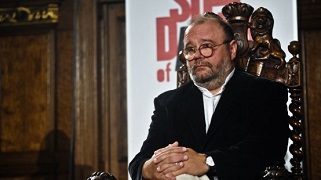
Paweł Huelle (Gdańsk, 10 september 1957)
De Amerikaanse dichteres Mary Oliver werd geboren op 10 september 1936 in Maple Heights, Ohio. Zie ook mijn blog van 10 september 2010 en eveneens alle tags voor Mary Oliver op dit blog.
Mockingbirds
This morning
two mockingbirds
in the green field
were spinning and tossing
the white ribbons
of their songs
into the air.
I had nothing
better to do
than listen.
I mean this
seriously.
In Greece,
a long time ago,
an old couple
opened their door
to two strangers
who were,
it soon appeared,
not men at all,
but gods.
It is my favorite story–
how the old couple
had almost nothing to give
but their willingness
to be attentive–
but for this alone
the gods loved them
and blessed them–
when they rose
out of their mortal bodies,
like a million particles of water
from a fountain,
the light
swept into all the corners
of the cottage,
and the old couple,
shaken with understanding,
bowed down–
but still they asked for nothing
but the difficult life
which they had already.
And the gods smiled, as they vanished,
clapping their great wings.
Wherever it was
I was supposed to be
this morning–
whatever it was I said
I would be doing–
I was standing
at the edge of the field–
I was hurrying
through my own soul,
opening its dark doors–
I was leaning out;
I was listening
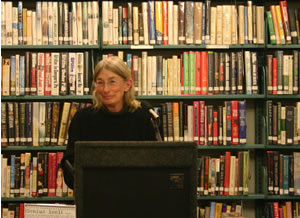
Mary Oliver (Maple Heights, 10 september 1935)
De Surinaamse dichter en schrijver Eddy Louis Pinas werd geboren in Paramaribo op 10 september 1939. Zie ook alle tags voor Eddy Pinas op dit blog.
STON OSO (NAJAAR 2003)
de zon vreet zich een bestaan
in de bakstenen gevel
en de restanten kozijn
waarvan de bladders reeds lang zijn
weggewaaid
vuile resten spandoek
wapperen als vergeten vlaggen
uit een voorbije tijd
naast mij zeurt een vrouw
over een verkeerd geparkeerde auto
terwijl daar een stuk nalatenschap
stil en roemloos
ten onder gaat
KINDERREALITEIT
Ik vind je lief
mooie glimrode ronde kokriki
met je zwart oogje
zie je ook wanneer ik stout ben
lieve roodronde glimmende
kokkertje met het zwarte oog
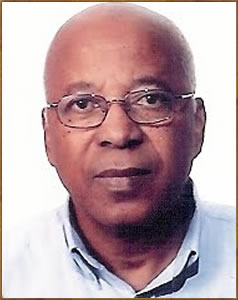
Eddy Pinas (Paramaribo, 10 september 1939)
De Deense dichter en schrijver Jeppe Aakjær werd geboren in Aakjær bij Skive op 10 september 1866. Zie ook alle tags voor Jeppe Aakjaer op dit blog en ook mijn blog van 10 september 2010
Uit: Menschenhandel (Vertaald door Erich Holm)
»Kein Geschäft für den Krämer heut? Zwirn! Heftel! Waschseife! Litzen! Knopflochseide! Nähnadeln!« Kresten schüttelte einen gewaltigen Haufen verlockender Dinge auf den Tisch hin.
»Und da wären dann auch noch verschiedene Schnurrpfeifereien!« Damit deutete er auf einige besonders verführerische Waren, wie Messer, Frisierkämme und farbige Taschentücher mit Bildern des Kronprinzen und der Schlacht bei Fredericia.
»Nein, gar nichts brauchen wir,« sagte Ann-Marie unwirsch und schob mit der rechten Hand ihre zerzausten Haarbüschel unter das Kopftuch. »Laufst aber auch mit dem elendesten Kram herum. Von den letzten Nähnadeln, die man von dir gehabt, war eine jede hin, sowie man sie nur eingefädelt hat.«
»Du hast gewiß deinen Zorn an ihnen ausgelassen, denn meine Nähnadeln, die halten sonst ein ganzes Menschenleben aus.
Keine alten Fetzen oder Knochen da zum Weggeben?« setzte der Krämer hinzu.
»O, Fetzen mehr als genug, wenn man sie nur so leicht entbehren könnt. Und die Knochen, die nagt der Per so fein ab, daß für ’n Krämer kaum was übrig bleibt.«
»Aber einen Schluck Schnaps wird’s doch bei euch geben?«
»Nein, bei Gott nicht,« beteuerte Ann-Marie Kjærsgaard. »Wo war denn bei uns je ein Tropfen Branntwein im Haus, der nicht dem Morten gleich durch die Gurgel müßt? Schnaps, der ist gar rar bei uns.«
Morten wetzte unruhig auf seiner Bankecke hin und her. »O, du sperrst dich grad auch nicht gegen einen Kümmel, wenn dir ihn nur einer spendieren mag,« warf er ein.
»Also gar nichts Gebranntes habt ihr im Haus?« fuhr der Nadelkrämer fort. »Da ist’s freilich kein Wunder, daß ihr den Schnabel so hängen laßt. Na, gegen die Krankheit weiß ich noch ein Rezept.«
Der Krämer spreizte den einen Rockschoß wie einen Adlerfittich aus und schielte in die fast ellentiefe Tasche hinab, aus der er triumphierend eine grüne Literflasche heraufholte. Mit einer großartigen, weitausholenden Gebärde setzte er sie dem Schuhmacher vor die Nase und sagte: »Da ist jetzt, alle Wetter, der Branntwein, rückt ihr dafür mit Bier heraus!«
»Ja Bier, davon wird just ebensoviel da sein wie vom Schnaps. Aber das läßt sich am Ende doch eher beschaffen. Dem Nielsen sein Weib drunten hat uns einen Krug voll versprochen, wenn sie brauen.“
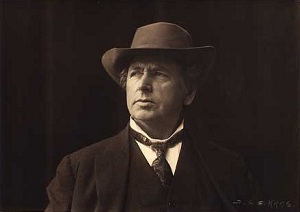
Jeppe Aakjær (10 september 1866 – 22 april 1930)
Rond 1910
Zie voor nog meer schrijvers van de 10e september eveneens mijn blog van 10 september 2011 deel 2.
